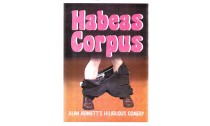Habeas Corpus
THEATRE ON THE STEPS PRODUCTION of Habeas Corpus by Alan Bennett
The play highlights the sexual excesses of the middle classes in the 1960s. It centres around Dr Arthur Wicksteed, his family and some of the people they meet. There are three main plots, all of which meet at some point in the proceedings. Arthur Wicksteed MD, trusted medical practitioner, is tempted by the feminine charms of a young lady who wanders into his surgery one afternoon feeling faint. By chance she meets the doctor's hypochondriac son, Dennis, during her visit and learns that he is terminally ill with Brett's Palsy. This is the answer to her dreams as the honorable Felicity Rumpers is with child out of wedlock, a wicked crime, even in those promiscuous times. Three months of wedded bliss with the terminally ill Dennis will give her the respectability she needs when the baby eventually arrives.
Arthur's sister, Connie, is a little challenged around the bosom and hence has difficulty in attracting acceptable male suitors. Her current courtship with the limp Canon Throbbing has spent ten years in complete stagnation. Connie's fortunes change with the arrival of an appliance designed to give more proportion to her frontage as she uses her new-found confidence to attract the visiting President of the BMA, Sir Percy Shorter. Arthur's wife, Muriel, is put out by Percy's preference for the dowdy Connie, especially as it was she who arranged for the eminent doctor to visit. Muriel is not left out of the relational merry-go-round as she welcomes Connie's appliance fitter into the house. He immediately believes that he has found the right Wicksteed and begins to adjust the appliance. She believes that he is exercising an incredibly cheeky opening gambit and responds with pleasure to his flattery. Still at cross purposes Denzil Shanks takes photographs of Muriel to share with his colleagues back at Leatherhead, the appliance fitter headquarters.
As the play progresses there is indignation and counter-indignation as the various blossoming relationships are revealed to spouses and lovers. Muriel banishes Arthur from the family home for his intentions toward Felicity, Sir Percy threatens to have Arthur struck from the medical register and the Canon pleads with Connie to return to him. Felicity learns that Dennis is a hypochondriac and unlikely to die and Sir Percy glimpses Connie without her appliance and rejects her. The key to unravelling this maelstrom of hypocrisy is the arrival of Lady Rumpers, mother of Felicity, who manages to discover that Sir Percy was the locum with whom she had sexual relations under the table during an air raid in Liverpool just prior to boarding a ship to the colonies. Thus the identity of Felicity's father is revealed. Arthur's fortunes take a sudden turn for the better as a little quid pro quo is suggested, even more so when he discovers the photographs of Muriel taken by Shanks. Suffice to say that most people get what they wanted in the end, with the possible exception of Canon Throbbing.
The whole drama is narrated by Mrs Swabb, housekeeper to the Wicksteeds and representative of the working classes. Part of the irony was the maintenance of a higher moral standard by those who toil by the sweat of their brow as compared with the more privileged few. To aid Mrs Swabb in her castigation of the middle classes another character is introduced, Mrs Purdue, a manic depressive whose National Health status led to her plight and subsequent attempts at suicide being ignored by the good doctor.
The Cast
Arthur Wicksteed Iain Reddihough
Muriel Wicksteed Sarah Raymond
Dennis Wicksteed Matt Lim
Constance Wicksteed Sheena Grant
Mrs Swabb Liz Herdson
Cannon Throbbing John Britton
Lady Rumpers Enid Bibby
Felicity Rumpers Kerry Roussel
Mr Shanks John Muxworthy
Sir Percy Shorter Matt Shearan
Mrs Purdue Anna Griffiths
Directed by Gordon Grant
Produced by Bob Bibby
THEATRE ON THE STEPS - CONDITION OF TICKET SALES
- Once purchased tickets may not be exchanged nor money refunded.
- Smoking in all areas of the Theatre is strictly forbidden.
- Only food and drink purchased on the premises may be consumed in the building.
- Mobile phones and digital watch alarms must be switched off in the auditorium.
- In the interests of other patrons, babes in arms are not usually admitted. Exceptions may be made for pantomime and certain children's shows, when prior arrangements should be made with the Box Office and a ticket purchased irrespective of the age of the child.
- Due to fire regulations, all patrons, including babes in arms, must be in possession of a valid ticket before entering the auditorium.
- The management reserve the right to refuse admission of the ticket holder to the premises.
- The Management reserve the right to request the ticket holder to leave the premises and to take any appropriate measure to enforce such a request.
- Cameras and any form of audio or visual recording equipment are strictly forbidden in the auditorium.
- Latecomers will not be admitted, (prior to the show or after the interval) until a suitable break in the performance. Latecomers if admitted, may be required to occupy alternative seats.
- The Management may alter or vary the programme, artistes and timings without consultation or compensation.
- The performance may be cancelled for reasons beyond the control of the Management without notice and without the Theatre being liable to pay any person any compensation whatsoever other than a possible percentage or maximum refund to the ticket holder of the value of the ticket.
- When you book online we reserve the right to refuse entry to the theatre if your order confirmation e-mail is not produced upon your visit to the Theatre.
Supported by:









